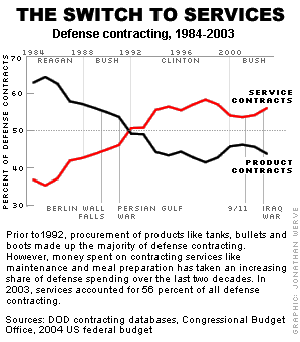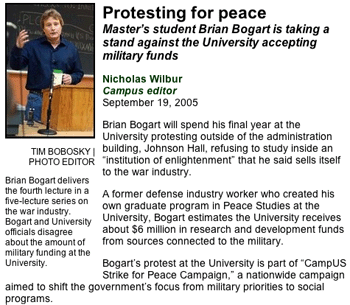Activist Brian Bogart asked himself: “Our top industry has been the manufacture and sale of weapons — and we’re a peace-loving nation?” Inspired
by this paradox, Bogart created Strike for Peace . . . described on its website as an attempt “to highlight for everyone’s sake the dominant role of the
military industry in America’s economy. We stand for a future of shared
resources instead of a future of resource wars. The weapons we help the
Pentagon develop in our schools will be used in such wars unless we step
away from the microscope to see the macro view and change America’s priority
from war-industry profit to the Founding vision of prosperity for all.”
“The action I’m taking is not about political parties,” Brian declares.
“It’s about deadly priorities that have been ruining this country for 55
years and causing a world of suffering, even here at home, and even to our
soldiers abroad.”
I interviewed Brian Bogart via e-mail:
MZ: What was the spark for “Strike for Peace”?
BB: I took seriously what I was taught about the founding vision: that
America is a peace-loving nation run by servants who operate by the consent
of the governed (the people), and that American citizens have a duty to
monitor their governing body very closely. We are often told we have a
government of, by, and for the people, and the Declaration of Independence
states more than once that the people have a duty to alter or abolish any
government that threatens their future security. All of this means we are
supposed to be responsible, to participate — not just by voting, but by
knowing exactly what’s really going on in government every minute of every
day.
MZ: In other words, take control? In America?
BB: Obviously, Americans have lost control of America, or possibly never
really had control. Most people are too overwhelmed to even talk about the
mess we have today in Washington DC. But, in my Silicon Valley career, and then in my first
three years of independent research as University of Oregon’s only graduate
student in Peace Studies, I learned something we don’t learn enough of in
schools: that the American people were ripped off in 1950, that without the
knowledge and consent of the American people, the office of President Harry Truman — a Democrat — decided to adopt a weapons-for-profit-based economy and
launch the Cold War against the Soviet Union.
MZ: What’s been the fallout of the rip-off you describe?
BB: Since 1950, our nation has been dependent on conflict — and the world has
suffered more than 200 wars. Our factories that made trains and buses and
other necessities for public use were converted for military purposes, and
that technology was shipped overseas — so today we import these things and do
not have the ability to produce them. Since 1950, our top industry has been
the manufacture and sale of weapons — and we’re a peace-loving nation? Our
economic-aid packages to developing countries are filled with weapons, and
any loans we provide come with terms that allow us to control and perpetuate
their internal strife.
MZ: In other words, the U.S. taxpayer is funding war and knows very little
about it.
BB: I slowly saw this in my career when I was making parts for televisions
in Silicon Valley, when suddenly our companies were saturated with weapons
contracts coming from the Pentagon. I saw so much of our hard-earned taxes
being spent on weapons that benefited only top executives. Even more
wasteful contracts were justified as necessary for the Cold War. For
example, I saw trillions of taxpayer dollars going to waste on President
Reagan’s “Star Wars” missile defense system, which was never deployed. Servants in power today say “Star Wars” was necessary to frighten the Soviet
Union into spending all of its wealth on weapons. “Star Wars” was,
therefore, never intended to be deployed. But if we won the Cold War, why
are we today wasting even more of the people’s money making even deadlier
weapons? And doesn’t spending our wealth on weapons take us down the same
path as the Soviet Union? The answer is our leaders are addicted to profit,
and serve a war-for-profit machine adopted in 1950.
MZ: This machine requires an enemy.
 BB: When we won the Cold War, our leaders were faced with a loss-of-profit
BB: When we won the Cold War, our leaders were faced with a loss-of-profit
crisis called “peace.” So, the Pentagon outsourced its weapons projects and
supply requirements to our companies and schools. The Army used to make its
own tuna sandwiches, but today Bumble Bee has a lucrative Pentagon contract,
and therefore a stake in conflict and a good reason not to speak out against
war. The Navy used to make its own soup, but today Campbell’s has a Pentagon
contract, and therefore a stake in conflict and a good reason not to speak
out against war. The Base Realignment and Closure hearings were not only
designed to deploy our forces and bases around the world — and that’s made
very clear in the Pentagon’s National Defense Strategy — but the sentiments
stirred up among workers here who want to keep their jobs create that many
more reasons for Americans not to speak out against war. Today more than
300,000 companies have Pentagon contracts. Some 400 colleges develop combat
programs on campus to make up for the diversion of state funds to the
so-called “war on terror.”
MZ: Why do you think there isn’t more outrage over this system of corporate
welfare?
BB: Americans are not learning these basic facts about their country, but
they are being hired and trained as cogs in our war machine, paid to be
silent workers and accomplices, paid to participate in the industry of war
while being influenced to ignore the violence and wastefulness of war. Nearly all of our problems, nearly all threats to the future, bleed from
this wound in American history, and only an outcry of popular demand can
change it. Dissent is the highest form of patriotism, so it is right that we
stop to learn what’s really happening, and it is right that we stand up and
speak out. But we must do it together or our servants will continue to steal
everything we have, including our lives.
MZ: Assuming more Americans became aware, what do you see as a way to
channel this awareness?
BB: History’s greatest lesson tells us to take the profit out of war, and
until we do that, we will increasingly suffer from the misdirection of our
advancing technology. Both major parties have sustained the war industry for
55 years; both are rife with corruption. Changing administrations or ending
the war in Iraq without changing our national priority will neither alter
our course nor banish perpetual conflict.  I realized this after the third
I realized this after the third
year of my graduate program, and decided to spend my final year striking for
peace, camped across from the administration building at University of
Oregon to — with the assistance of other caring students — bring attention to
the root cause of the world’s (and America’s) problems. The purpose of the
CampU.S. Strike for Peace Campaign is to unite people against this priority
of weapons profit over human prosperity, because it is killing any chance of
success for equal rights, a clean environment, fair elections, a balanced
media, a just world, and a peaceful and meaningful future. Filling the world
with weapons is not reasonable and will never deliver security and
prosperity for all. We must take the profit out of war or war will take the
life out of us.
MZ: How’s it going so far?
BB: In just three weeks, we have succeeded in prompting our faculty senate
to address the issue of Pentagon-funded research (we have nineteen
future-combat related projects underway at UO, ten more than last year). We
have also been invited by members of Parliament as delegates to the December
2005 International Peace Conference in London, so we at StrikeForPeace.org are seeking funding assistance.
MZ: What can readers do to learn more and/or get involved?
BB: Go to www.StrikeForPeace.org and then contact us.

Mickey Z. is the author of several books, most recently 50 American Revolutions You’re Not Supposed to Know: Reclaiming American Patriotism (Disinformation Books). He can be found on the Web at
http://www.mickeyz.net.
